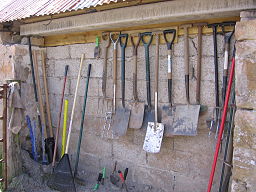Cleaning and Storing Garden Tools for Winter
Making sure your garden tools are cleaned and stored properly in the winter will prolong their useful life, saving you money. Clean sharp tools also make your work go easier, and come spring, you’ll be able to grab you tools and get to work on that first nice day-no spending time trying to chip off fossilized dirt from last year.
First, hose off any clinging dirt thoroughly. This may take some prying with a putty knife if you’ve let clay soil dry onto your tools (oops). For bladed tools like pruners and loppers, make sure dirt and plant debris is cleared from the pivot points. Remove any dried on sap with rubbing alcohol and fine steel wool. Allow to dry completely.
File off any chips or dents on the working edge of shovels, spades and trowels with a coarse file, then smooth with a honing tool or fine file (no need to put a knife-edge on them unless you’re worried about the zombie apocalypse, but a nice smooth edge will make digging chores much easier come spring!) Remove any rust with steel wool.
Sharpen bladed tools by following the original angle of the blade’s bevel, using a diamond honing tool. If your blade is very dull or chipped you’ll need to start with a coarse honing tool, then progress to a medium and fine tool.
If wood handles are rough, sand smooth, then rub with linseed oil. Keeping your wood-handled tools oiled in winter will keep them from splitting and cracking in the dry air of winter.
Finally, coat the metal parts lightly with vegetable oil or WD-40 and store in a dry place. In spring they’ll be clean, sharp and ready to go!
Don't you hate it when you pull out your hoses in the spring and the shutoff drips all over your feet? Water freezing in shutoff valves and spray nozzles can crack the mechanism inside, especially if they are plastic. Once that happens, they will drip and dribble and get you all wet. Detach them from the hose and store them inside where they won't freeze, and they will last much longer.
Drain out hoses, roll up and store, preferably indoors where it's warm. Cold hoses can be so stiff that they are difficult to use if you need to pull them out for watering in a mid-winter warm spell. If you do leave your hoses outside, detach them from any outdoor water faucets to avoid freezing the pipe.
If your outdoor faucet has an indoor shutoff, turn it off and drain it. Or install an insulating faucet cover available in hardware stores.

